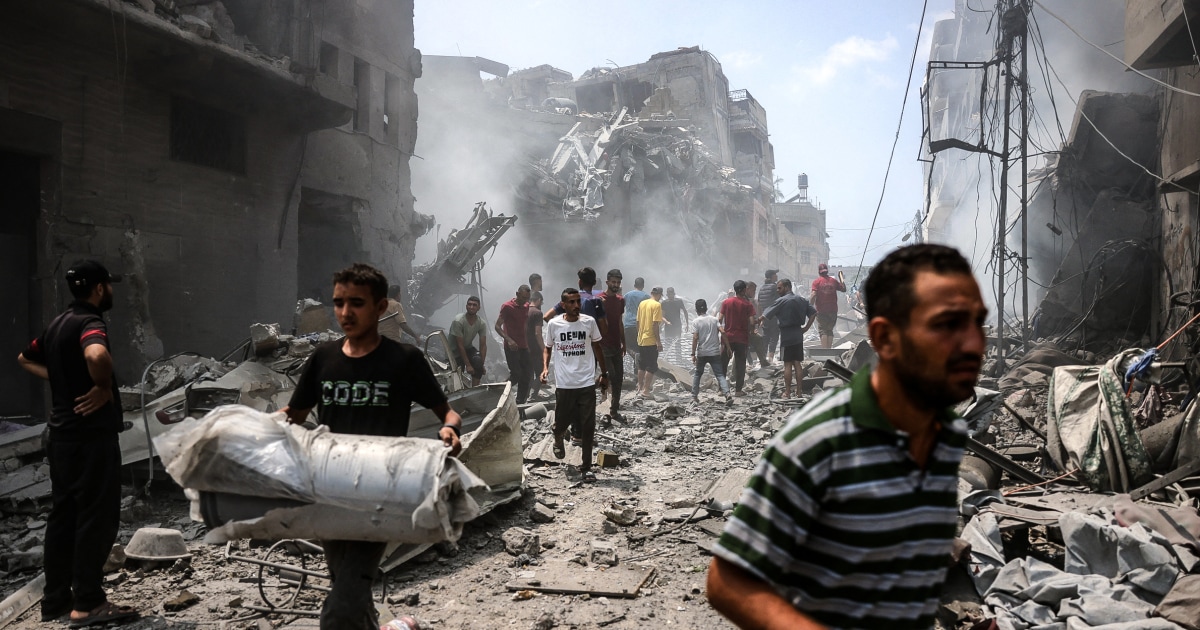Is the IDF Launching a Ground Offensive in Gaza City?

Published: 2025-09-16 07:16:07 | Category: Trump GNEWS Search
In a critical moment for the ongoing Israel-Hamas conflict, Secretary of State Marco Rubio has highlighted the urgency for a ceasefire, noting that Israel has initiated operations in Gaza City. With a limited window of opportunity for negotiations, Rubio's remarks underscore the complexities of diplomacy in the region, especially following heightened tensions after an Israeli strike in Qatar.
Last updated: 14 October 2023 (BST)
Key Takeaways
- Marco Rubio emphasises a pressing need for a ceasefire agreement in the Israel-Hamas conflict.
- Israel has reportedly begun operations in Gaza City, increasing pressure on Hamas.
- Rubio warns that the window for a diplomatic solution is closing rapidly, possibly within days.
- Qatar is seen as a crucial player in mediating the ceasefire, despite recent tensions over an Israeli strike.
- The U.S. administration seeks to maintain diplomatic relations with key allies in the region.
The Current Situation in Gaza
The ongoing conflict between Israel and Hamas has seen escalating violence, particularly in Gaza City, where military operations have intensified. This escalation presents a significant challenge to both humanitarian conditions and diplomatic efforts aimed at achieving a ceasefire.
Reports indicate that the Israeli Defence Forces (IDF) have increased their military presence and operations in Gaza City, targeting Hamas leadership and infrastructure. This surge in activity raises concerns about civilian casualties and the humanitarian crisis affecting the region.
Diplomatic Efforts and Regional Dynamics
Rubio's comments come during a pivotal diplomatic mission to Qatar, a nation that has historically acted as a mediator in the Israel-Hamas conflict. The recent Israeli airstrike on Qatari soil has stirred outrage among Qatari officials and may complicate ongoing negotiations.
Despite these tensions, Rubio has expressed confidence in Qatar's ability to facilitate discussions. He stated, “We don’t want to see anything that undermines that,” indicating a desire to strengthen Qatar's role in the peace process.
What’s at Stake?
The stakes in the Israel-Hamas conflict are incredibly high. A ceasefire is essential not only for the immediate relief of humanitarian suffering in Gaza but also for the broader stability of the Middle East. With regional tensions already heightened, the potential for escalation could have far-reaching consequences.
Rubio’s assertion that the window for a ceasefire is narrowing suggests that time is of the essence. He noted, “We don’t have months anymore, and we probably have days and maybe a few weeks.” This sense of urgency reflects the reality that prolonged conflict could exacerbate existing grievances and ignite further violence.
The Role of Qatar in Mediation
Qatar has long been involved in mediating conflicts in the Middle East, leveraging its relationships with various factions, including Hamas. As a major donor to Gaza and a supporter of Palestinian rights, Qatar's position is uniquely influential. Rubio's visit aims to reinforce Qatar's role in seeking an end to hostilities.
However, the recent Israeli strike complicates this role. The incident not only challenges Qatar's standing but also raises questions about the U.S. administration's ability to navigate alliances in the region while maintaining pressure on Hamas.
The Implications of U.S. Involvement
The U.S. has a vested interest in the outcome of the Israel-Hamas conflict, particularly regarding the stability of its allies in the Middle East. Rubio's remarks illustrate a strategic approach that seeks to balance support for Israel with the need for diplomatic engagement with other regional partners, such as Qatar.
By emphasising the importance of Qatar in mediating the ceasefire, the U.S. aims to project a united front while encouraging a resolution that addresses humanitarian needs and regional security concerns.
Public and International Reactions
Responses to Rubio's statements have been mixed. Some analysts laud the proactive diplomatic engagement, while others criticise the U.S. response to the Israeli strike in Qatar as ineffective. The tensions highlight the delicate balance required in foreign policy, especially when addressing conflicts with deep historical roots.
Internationally, the situation has drawn attention from various human rights organisations and foreign governments, all calling for an immediate cessation of hostilities and renewed dialogue. The urgency of the situation cannot be overstated, as it poses risks not just to the immediate region but to global security interests as well.
What Happens Next?
As negotiations continue, the immediate focus will likely remain on securing a ceasefire. The timeline for achieving this remains uncertain, but the urgency expressed by Rubio suggests that a breakthrough could be imminent if both sides are willing to engage in dialogue.
In the coming days, we may see increased diplomatic activity, particularly from Qatar, as they work to mediate terms that could alleviate the humanitarian crisis while addressing security concerns for Israel. The international community will be watching closely, as any developments will have implications for broader geopolitical dynamics in the region.
Conclusion
The situation in Gaza is complex and evolving, and the comments made by Secretary of State Marco Rubio reflect a crucial moment in the ongoing Israel-Hamas conflict. With a tight timeline for potential negotiations, the role of Qatar as a mediator takes on added significance. As international diplomatic efforts intensify, the hope remains that a ceasefire can be achieved, bringing much-needed relief to those affected by the violence.
With tensions at a boiling point, how will the international community respond to the developments in Gaza? Only time will reveal the outcomes of these critical negotiations. #IsraelHamasConflict #CeasefireNegotiations #MiddleEastDiplomacy
FAQs
What operations has Israel begun in Gaza City?
Israel has reportedly intensified military operations in Gaza City, targeting Hamas leadership and infrastructure amid ongoing conflict, raising concerns about civilian casualties.
Why is Qatar significant in the Israel-Hamas conflict?
Qatar has acted as a mediator in the Israel-Hamas conflict, leveraging its relationships with various factions. Its involvement is crucial for facilitating peace negotiations.
What did Rubio mean by a “short window of time” for a ceasefire?
Rubio indicated that the opportunity for a ceasefire is rapidly diminishing, suggesting that negotiations need to occur soon—potentially within days or weeks—to be effective.
What are the implications of the Israeli strike on Qatari soil?
The Israeli strike on Qatari soil has outraged Doha and complicated diplomatic relations, potentially undermining Qatar's ability to mediate effectively in the Israel-Hamas conflict.
How might the U.S. influence the outcome of the conflict?
The U.S. seeks to balance its support for Israel while encouraging diplomatic solutions through allies like Qatar, aiming to stabilise the region and address humanitarian needs.



